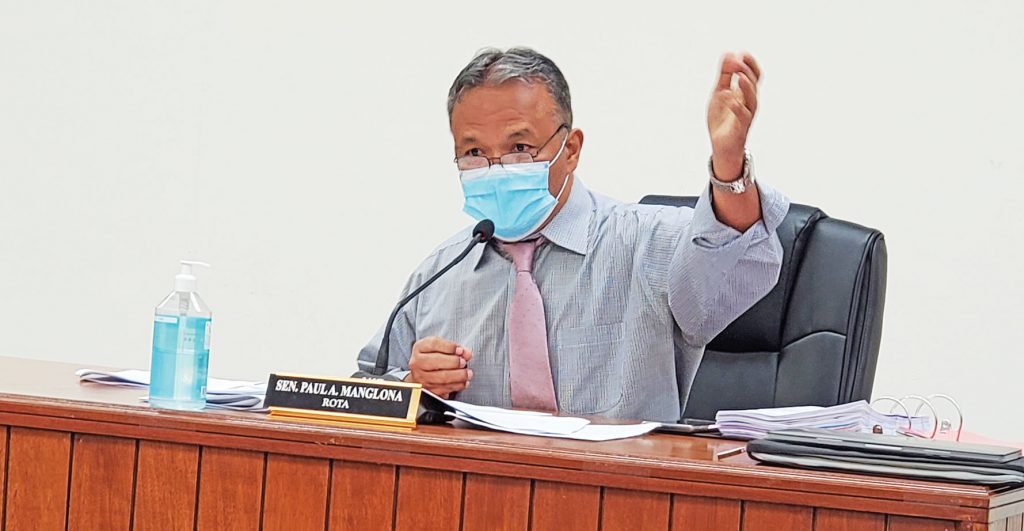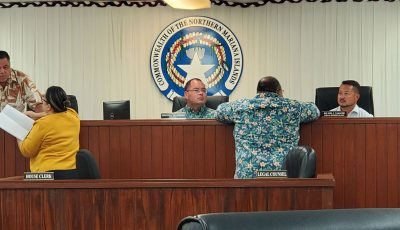House’s ARPA bill goes back to committee

Sen. Paul A. Manglona (Ind-Rota) gestures as he explained at the Senate’s Tuesday session the need to pass House Bill 22-33 that seeks to give the Legislature appropriation powers over the American Rescue Plan Act money that will be given to the CNMI. Manglona later withdrew his motion upon hearing the advice of Senate counsel Joe Bermudes. (FERDIE DE LA TORRE)
At the recommendation of the Senate’s legal counsel, senators unanimously agreed Tuesday not to act at this time on a House of Representatives bill that seeks to give the Legislature appropriation powers over the more than half-a-billion dollars in American Rescue Plan Act money that’s allocated to the CNMI.
Sen. Paul A. Manglona (Ind-Rota) moved to pass House Bill 22-33 at the session, but later retracted his motion upon hearing the recommendation of Senate legal counsel Joe Bermudes and Senate President Jude U. Hofschneider (R-Tinian), as well as the arguments of Sen. Victor B. Hocog (R-Rota).
All nine senators voted that the bill shall remain before the Senate Fiscal Affairs Committee, which Hocog chairs, pending Bermudes’ review of the contrasting opinions on the House of Representatives’ “tie-breaker rule.”
Last March 19, House Speaker Edmund S. Villagomez (Ind-Saipan) voted twice—as authorized under the House’s tie-breaker rule—to break a 10-10 tie to pass House Bill 22-33, authored by Rep. Donald M. Manglona (Ind-Rota).
Attorney General Edward Manibusan later issued an opinion, saying that the rule, which allows the speaker to vote twice in the event of a tie, contravenes the CNMI Constitution’s provision on the minimum vote requirement. Manibusan also recommended that a possible solution to resolve the dispute is to submit a certified question petition to the CNMI Supreme Court on the matter.
At the Senate session Tuesday, Manglona asked his colleagues to pass House Bill 22-33, which he described as a simple legislation that grants each and every one of them in the Legislature the right to do what they’re supposed to be doing in the first place.
“If we make a mistake, then let’s say the attorney general is right, what’s the big deal?” Manglona asked.
Citing the Senate’s own rules, the senator said the Senate’s only concern is that this bill be signed for legal sufficiency, which has already been done by the House legal counsel.
He said he has no concern about how the outcome will be if this will be taken to the Supreme Court through a certified question for something that they, as lawmakers, are trying to exercise authority to safeguard the funding.
When asked for his recommendation, Bermudes said the Senate should not pass the bill at this point and that it should remain before the Fiscal Affairs Committee pending his (Bermudes’) review of both opinions of the AG and the House’s legal counsel on the tie-breaker rule. “I will review both and then come up with an answer. …When I give my answer I will stand by my answer. Right or wrong but I will stick to my answer,” he said. “Either yes, the AG is right, or no the AG is wrong and the House counsel is right. And I will stick to my decision.”
Hofschneider also asked the Senate Fiscal Affairs Committee to address the concerns raised by their counsel. “Not acting on it today doesn’t mean that the bill is [going to] die. It just giving us more time to address those concerns,” said Hofschneider. He asked Hocog to prioritize this bill.
The Senate president pointed out, though, that the Torres-Palacios administration has already reached out to him and Villagomez on ARPA. Hofschneider said the administration will be working to present its expenditure plan based on what is allowed under the ARPA.
“So it’s not [like] we’re not being involved with this exercise. It’s simply getting involved in one form or another,” he added.
Hofschneider then asked Manglona to reconsider his original motion to pass the bill and allow Hocog’s committee to work on it and have it tackled at their next session. Manglona agreed and requested that the bill be placed on their final reading calendar for the next session. Manglona then withdrew his motion to pass the bill.
The CNMI is estimated to receive $507 million in ARPA funding.
Hocog said what he really needs to understand is whether the action to be taken by his committee is within legal limits, referring to the power of the Legislature to appropriate this federal money.
“What are the do’s and don’ts? I don’t know. I have not received any information on whoever is given the authority in the distribution of these funds. What are the do’s and don’ts in this funding?” Hocog asked.
The senator said he has no answer to the question if the Legislature can act on an appropriation made by the federal government and whether the CNMI Legislature can appropriate this funding. “That’s why I am seeking the legal opinion from people that understand more of the process on how to distribute this funding,” Hocog said.
What’s the use for the Legislature to pass this legislation in its current form, just to find out that it will be vetoed by the governor as a result of the AG’s opinion if it’s true that there is a question of how this bill was passed, he added.
Also, Hocog said, it’s not anyone’s business in the Senate to intervene in how the House voted on the bill. He said if there is a question on how the House passed the bill let them fix it themselves.
He said if the members allow him some time to ensure that his committee receives public comments on this legislation, then the committee will report that to the Senate for further action.
“I guess I would have to abide with the advice of our legal counsel that this bill should remain in the committee at this point in time before we take any action today,” Hocog said.
When asked as to when he will be releasing his opinion, Bermudes said he cannot give a specific date at this point. He said it may take a short time, or may take a couple of days.
“I have to review the issue thoroughly,” the lawyer said.



























